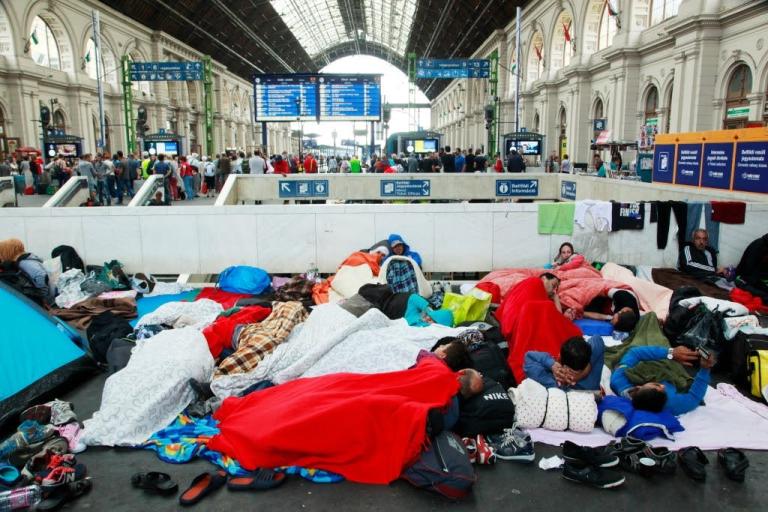
It’s Christmas, and massive numbers of people are arriving at the southern border of the United States claiming they are seeking asylum (the vast majority are coming for economic reasons so ineligible, and even if they were, it is not so sustainable for the United States to throw open our borders in this manner, but that’s for another day), so that means another round of tweets and articles claiming “Jesus was a refugee.” Plus, of course, “Jesus was a Person of Color” and “Jesus was born into poverty” and “Jesus was a member of an oppressed group” and so on. Plus, new for this year and most absurd, “Jesus was a Palestinian.”
And the implied purpose of these claims is to make the broader claim that the circumstances of Jesus’s birth were chosen by God in order to teach us, 2000 years in the future, that our faith is, if not exclusively then primarily about “Social Justice” as defined by its advocates.
But what if God chose the circumstances of Christ’s birth to be those most suited to ensuring the spread of Christianity? After all, if you take as a starting point a belief that God is in fact omniscient and sees across time and knows the decisions we humans will make, even if God isn’t in any way forcing us to make one decision or another, then it makes no sense that God would randomly choose a time and place, or that a “social justice” message would be what would factor in.
It is, after all, my understanding that the time and place of Jesus’s birth was “right” in a number of ways. On the one hand, any earlier would have been “too early”: Judea had only recently come under the control of the Roman Empire, the Pax Romana provided circumstances that we well-suited for Paul’s missionary journeys, the people of the cities he travelled to were predisposed to his message as something beyond the polytheistic paganism of the past (this was also the time when urban Romans were attracted to Judaism as “God-fearers”), etc. On the other hand, any later would have been “too late” due to the destruction of the Jewish temple during the First Jewish-Roman War starting in 66 AD. For that matter, even just a simple read of Wikipedia says that unrest began only a few short years after the crucifixion of Jesus, in 37 AD.
What about Jesus’s birthplace? In a blogpost a while back, I shared my pet theory that Bethlehem was not simply the birthplace of Joseph’s distant ancestors, but his hometown, from which he had temporarily moved to Nazareth to hone his skills as a craftsman, and when the census came, it was prudent to be formally registered in Bethlehem as it was in a different legal jurisdiction than Nazareth. Why Bethlehem in particular? It could have been a matter of the free-will decisions of generations before resulting in Bethlehem as the birthplace for a new king. Or it could be that the seemingly-convoluted “dual citizen” aspect of a Bethlehem birthplace and a Nazareth upbringing (plus, perhaps, family connections in Egypt) provided practical benefits in Jesus’s three years of spreading his message, and increasing the receptiveness of the hearers of that message.
(I’m not considering the Biblical prophesies as a relevant consideration here — after all, if you believe God sees throughout time, the question of where Jesus would be born preceded the prophesies.)
And was Joseph poor? There is nothing from the Bible that points to that (after all, “no room in the inn” is, I have read multiple times, better translated as “the spare bedroom was already occupied”). The most commonly-cited “proof-text” for Joseph’s poverty (e.g., at Catholic Answers) is that offering made in the temple for Mary’s purification was of “a pair of turtle doves or two young pigeons” which is the prescribed offering for someone who “cannot afford a lamb” (though some translations don’t have the financial implication there, but just say “is not able”). Honestly, what is surprising to me is that after looking at multiple hits in my google search and then trying again for information on ancient Judea in general, I couldn’t find more details about actual practices at the time when Jesus was born — everything online really seems to be about the mikvah and current Orthodox practices. But I don’t see any reason to believe that we should translate “can’t afford a lamb for a ritual sacrifice” to equal “poor,” especially since the text in Luke makes no comment but straightforwardly states that this was the case and in particular states that the specified sacrifice was “in accordance with the dictate in the law of the Lord.” It seems to me that this implies that the bird sacrifice had become the norm, with no need for explanation. In the end, when there is a binary option, rather than a middle ground, I see no reason to assume that the secondary option implies destitution rather than just “some unknown degree of not-rich.”
What’s more, there are hints that Jesus grew up in a family with at least some financial means. His first miracle, that is, before he started his ministry and would have been invited as a preacher, was at a wedding feast where he was a guest with Mary, and one presumes no family living in poverty would have had the social connections to be invited to such a feast. (In fact, there are several parables about weddings which are based on this premise.) The custom of the family to travel to Jerusalem for Passover along with a whole caravan of relatives and acquaintances is, according to one commentary which strikes me as making sense, an indicator of financial stability because only adult males were actually required to make the trip. And, lastly, Mary’s cousin Elizabeth was the wife of a priest, surely also not a marker of poverty.
And, again, it stands to reason that the financial circumstances of Mary and Joseph and, subsequently, Jesus before beginning his ministry would have been the “right” set of circumstances to maximize the degree to which people heard his message, rather than those circumstances which, 2000 years later, would best teach us to care for the poor, or open our doors to refugees, or be inclusive of people who look different than we do, or any other such “social justice” goal.












